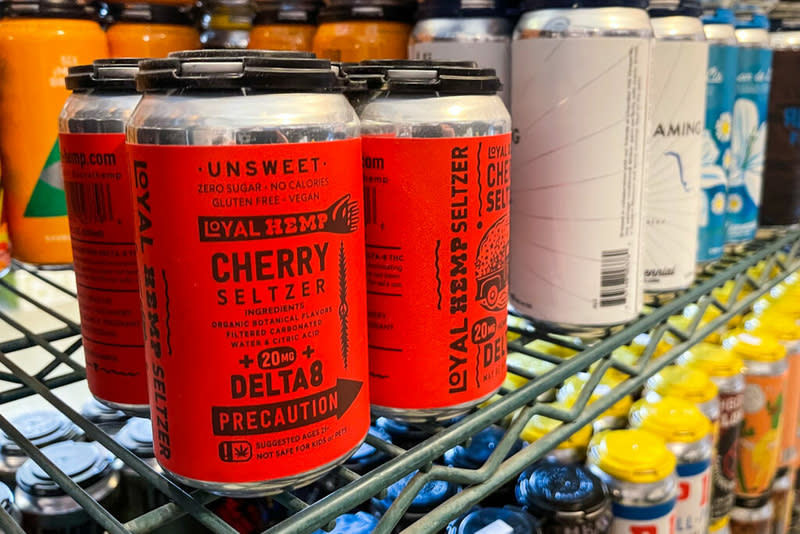Controversy surrounds bill that would regulate hemp industry

(Photo by Rebecca Rivas)
Big changes could be coming to New Jersey’s hemp market under a bill sitting on Gov. Phil Murphy’s desk that would require the state’s cannabis agency to regulate intoxicating hemp products like delta-8 and CBD.
The bill was intended to address complaints that children have too-easy access to hemp products, but some cannabis business supporters say the legislation, while well-intentioned, advanced with provisions they worry would undermine the state’s cannabis industry, like allowing liquor stores to sell hemp products.
Cannabis advocate Leo Bridgewater called the bill a “s*** show.”
It was among a flurry of bills lawmakers advanced and gave final approval to last week as they finalized the $56.6 billion budget.
Congress legalized hemp production in 2018, but there has been little regulation, testing, or enforcement, meaning products advertising thousands of milligrams of THC — the compound that gets users high — can be sold on the shelves of bodegas or gas stations, often with packaging that critics say attracts children to buy them.
The measure on Murphy’s desk would put intoxicating hemp products — a finished product with a total THC of not more than 0.3% derived from hemp — under the Cannabis Regulatory Commission’s purview. Intoxicating hemp products include delta-8 and delta-9, CBD, and other cannabinoids, and they have much less THC than cannabis products.
Critics say the bill amounts to a de-facto ban on hemp products by requiring anyone selling them to obtain a license from the state’s cannabis regulators, who would be tasked with creating rules and regulations for how hemp must be packaged, whether it should be subject to any fees, and how the licensing process will work.
Attorney Beau Huch, who represents hemp beverage companies, said the bill doesn’t allow for hemp products to be sold again until cannabis officials implement the new rules. Huch said he’s in favor of regulations, but he noted that the cannabis commission took a long time to approve the state’s first dispensaries to open, and license holders still face long wait times even for minor items like changing their business name.
“Definitely in favor of regulation, it’s just, who’s the regulator? What’s the timeline? And what is sufficient enough information to provide to the state out of the gate to keep products on the shelves, so it’s not a de-facto ban?” he said.
The bill also would only allow hemp products to be sold that are grown, cultivated, and produced within the state, which Huch said could violate the commerce clause of the U.S. Constitution. He said the high cost of land in New Jersey could lead to less production of hemp goods.
The bill would also allow liquor license holders to sell hemp products if they apply for a license with the Cannabis Regulatory Commission. Critics of the move say this would give the liquor store industry a backdoor to enter the cannabis industry, which many applicants have had trouble breaking into due to myriad state regulations and municipal restrictions.
Kevin Hagan, a lobbyist representing the New Jersey Liquor Store Alliance, said liquor stores already keep alcohol out of the hands of minors, and they can do that with hemp, too.
“The system is already in place, and it works,” said Hagan.
Under the bill, the Cannabis Regulatory Commission, along with the Division of Alcohol Beverage Control, would have 12 months to adopt rules concerning packaging, labeling, product testing and safety standards, THC levels, the limit of hemp beverages someone can buy at once, and a fee to cover administrative charges.
Bridgewater said he worries that the hemp industry will not have the same social equity requirements placed on the cannabis industry, even though retailers in both will be selling similar products. And he noted that lawmakers have moved to regulate hemp even though they have yet to advance a bill that would allow people to grow their own cannabis.
Bridgewater said lawmakers “don’t know what they’re getting themselves into.”
“We’re asking a bunch of Flintstones to write rules to a Jetsons game,” he said.
There’s also some confusion on the technical aspects of the bill and unanswered questions from supporters of the cannabis industry who want to see it thrive. Some wonder what happens to existing retailers that sell hemp in towns that have banned cannabis dispensaries, and whether the cannabis commission would levy a hemp tax.
“This bill isn’t perfect, but it does the job of stopping unregulated, untaxed, untested products being marketed and sold to minors right now,” said cannabis attorney Bill Caruso. “I think there’s a long regulatory process to work out some of the details, and it’s always possible the Legislature may need to come back and either add, clarify, or subtract to fix this.”
A spokeswoman for the Cannabis Regulatory Commission declined to comment on the bill.
GET THE MORNING HEADLINES DELIVERED TO YOUR INBOX
The post Controversy surrounds bill that would regulate hemp industry appeared first on New Jersey Monitor.

